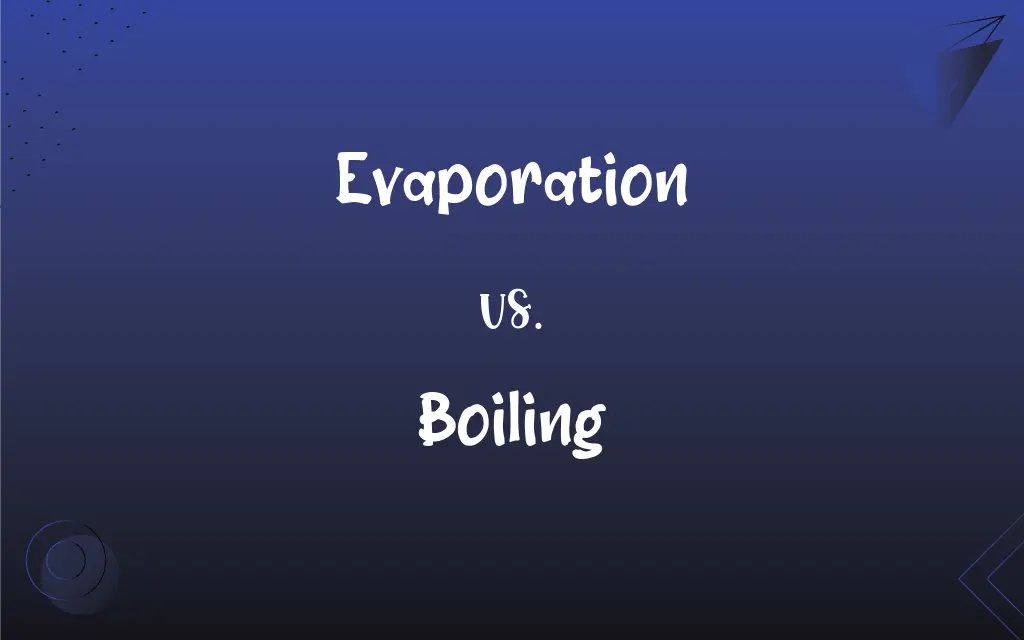Evaporation vs. Boiling: What's the Difference?
Edited by Janet White || By Harlon Moss || Updated on October 25, 2023
Evaporation is a surface phenomenon occurring at any temperature, while boiling happens throughout a liquid at its boiling point.

Key Differences
Evaporation is the process where molecules at the surface of a liquid gain enough energy to change into a gaseous state without the liquid reaching its boiling point. Boiling, on the other hand, is when the entire liquid reaches a temperature where its molecules have enough energy to transition into a gas.
Evaporation generally occurs slowly and is a surface phenomenon. This means it only involves the molecules present at the surface of the liquid. Boiling is a bulk process that involves the entire volume of the liquid, where bubbles of vapor form and rise to the surface.
Evaporation can take place at any temperature, even if it's below the boiling point of the liquid. This is because some molecules in a liquid have higher kinetic energy and can escape the liquid's surface. Boiling strictly occurs when the liquid reaches its specific boiling point, a temperature at which its vapor pressure equals the atmospheric pressure.
The process of evaporation does not necessarily require an external source of heat. It often happens due to the surrounding environment, like the sun warming up a puddle of water. Boiling typically requires an external source of heat to raise the temperature of the liquid to its boiling point.
Evaporation usually results in cooling of the liquid, as the most energetic molecules escape. Boiling, in contrast, involves the input of heat without a change in temperature, as all the energy goes into changing the liquid to a gas without raising its temperature further.
ADVERTISEMENT
Comparison Chart
Process
Surface phenomenon
Bulk process
Temperature
Can occur below boiling point
Occurs at boiling point
Speed
Generally slow
Rapid with bubble formation
Heat Source
Not always external
Typically requires external heat
Cooling Effect
Cools the remaining liquid
No cooling, energy goes to phase change
ADVERTISEMENT
Evaporation and Boiling Definitions
Evaporation
Evaporation is the process of a liquid turning into vapor without boiling.
After the rain, the puddles underwent evaporation and disappeared.
Boiling
Boiling requires an external heat source to achieve the boiling point.
He turned on the stove to initiate the boiling of the soup.
Evaporation
Evaporation occurs when molecules acquire enough energy to become vapor.
The heat from the sun causes evaporation of the ocean's surface.
Boiling
Boiling is the vigorous vaporization of a liquid when it heats to its boiling point.
She was waiting for the water to start boiling before adding the pasta.
Evaporation
Evaporation results in the cooling of the remaining liquid.
As evaporation took place, the bowl of water felt cooler to touch.
Boiling
Boiling is the phase transition from a liquid to a gaseous state at a specific temperature.
The boiling of water occurs at 100°C at sea level.
Evaporation
Evaporation can happen at any temperature below a liquid's boiling point.
Despite the cold weather, evaporation from the lake was evident.
Boiling
Boiling involves the formation of bubbles throughout the liquid.
When boiling, the bubbles in the pot indicated it was ready for cooking.
Evaporation
Evaporation is a surface phenomenon where molecules escape from the liquid's surface.
Due to evaporation, the water level in the glass reduced over time.
Boiling
Boiling is a bulk process involving the entire volume of the liquid.
The boiling kettle whistled, signaling it was time for tea.
Evaporation
To convert or change into a vapor.
Boiling
Heated to or past the boiling point
A kettle of boiling water.
FAQs
What is evaporation?
Evaporation is the process of a liquid turning into vapor without reaching its boiling point.
What is boiling?
Boiling is the vaporization of a liquid when it reaches its specific boiling point.
Why don't we see bubbles during evaporation?
Because evaporation is a surface phenomenon, and bubbles form during boiling due to vaporization within the bulk liquid.
Why is boiling considered a rapid process?
Because boiling involves the entire volume of the liquid and the formation of many vapor bubbles simultaneously.
Can we slow down the rate of evaporation?
Yes, by reducing the surface area, lowering the temperature, or increasing humidity.
Can evaporation occur at any temperature?
Yes, evaporation can occur below the boiling point of the liquid.
Is evaporation a slow process?
Generally, yes, evaporation is a slower process compared to boiling.
Does boiling produce bubbles?
Yes, boiling results in the formation of vapor bubbles throughout the liquid.
Why does evaporation cool the remaining liquid?
Evaporation involves the escape of the most energetic molecules, leaving behind cooler ones.
Does saltwater have the same boiling point as pure water?
No, adding salt raises the boiling point of water slightly, a phenomenon known as boiling point elevation.
Does boiling only occur at the boiling point?
Yes, boiling occurs when a liquid reaches its specific boiling point.
Do both evaporation and boiling result in a gaseous state?
Yes, both processes result in the transformation of a liquid to a gaseous state.
Does boiling water always mean it's at 100°C?
No, the boiling point of water varies with atmospheric pressure; at sea level, it's 100°C.
How does altitude affect boiling and evaporation?
Higher altitudes have lower atmospheric pressure, which can lower the boiling point of liquids but doesn't significantly change the nature of evaporation.
Is the boiling point the same for all liquids?
No, different liquids have different boiling points depending on their molecular structure and atmospheric pressure.
Is evaporation a surface or bulk phenomenon?
Evaporation is a surface phenomenon, involving only the molecules at the liquid's surface.
Can a liquid evaporate in a closed container?
Yes, but it will reach an equilibrium where the rate of evaporation equals the rate of condensation.
Is boiling a surface or bulk phenomenon?
Boiling is a bulk process, involving the entire volume of the liquid.
Can boiling and evaporation occur simultaneously?
Yes, while a liquid is boiling, evaporation can still occur at its surface.
Do I always need an external heat source for evaporation?
No, evaporation can occur due to the surrounding environment without an external heat source.
About Author
Written by
Harlon MossHarlon is a seasoned quality moderator and accomplished content writer for Difference Wiki. An alumnus of the prestigious University of California, he earned his degree in Computer Science. Leveraging his academic background, Harlon brings a meticulous and informed perspective to his work, ensuring content accuracy and excellence.
Edited by
Janet WhiteJanet White has been an esteemed writer and blogger for Difference Wiki. Holding a Master's degree in Science and Medical Journalism from the prestigious Boston University, she has consistently demonstrated her expertise and passion for her field. When she's not immersed in her work, Janet relishes her time exercising, delving into a good book, and cherishing moments with friends and family.































































